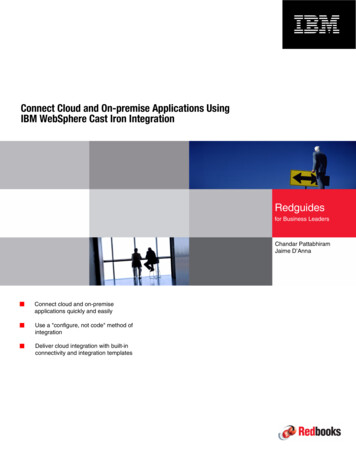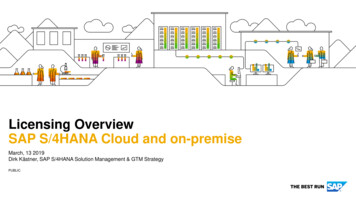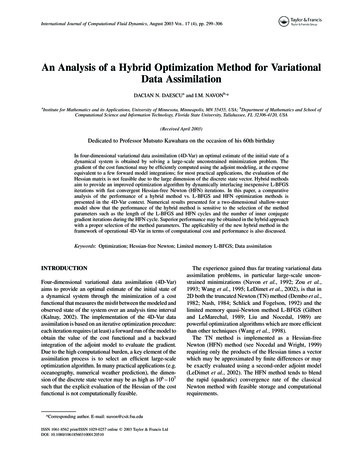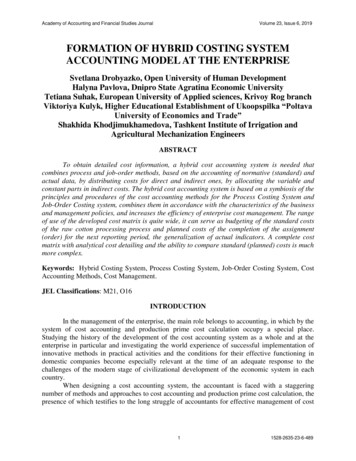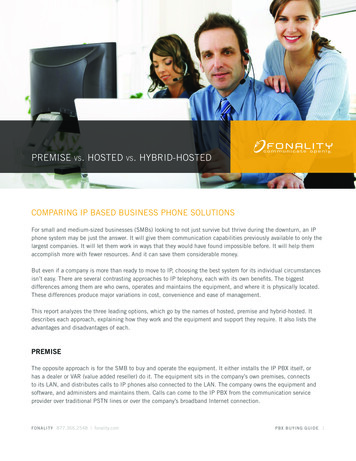
Transcription
.Hybrid-HostedComparing Ip based business Phone solutionsFor small and medium-sized businesses (SMBs) looking to not just survive but thrive during the downturn, an IPphone system may be just the answer. It will give them communication capabilities previously available to only thelargest companies. It will let them work in ways that they would have found impossible before. It will help themaccomplish more with fewer resources. And it can save them considerable money.But even if a company is more than ready to move to IP, choosing the best system for its individual circumstancesisn’t easy. There are several contrasting approaches to IP telephony, each with its own benefits. The biggestdifferences among them are who owns, operates and maintains the equipment, and where it is physically located.These differences produce major variations in cost, convenience and ease of management.This report analyzes the three leading options, which go by the names of hosted, premise and hybrid-hosted. Itdescribes each approach, explaining how they work and the equipment and support they require. It also lists theadvantages and disadvantages of each.PREMISEThe opposite approach is for the SMB to buy and operate the equipment. It either installs the IP PBX itself, orhas a dealer or VAR (value added reseller) do it. The equipment sits in the company’s own premises, connectsto its LAN, and distributes calls to IP phones also connected to the LAN. The company owns the equipment andsoftware, and administers and maintains them. Calls can come to the IP PBX from the communication serviceprovider over traditional PSTN lines or over the company’s broadband Internet connection.fo n a l i t y 877.366.2548 fonality.compb x bu ying g u id e 1
Premisevs.Hostedvs.Hybrid-HostedThe premise approach has several advantages. Although the upfront cost is higher than with hosted service, at theend of the day the company owns the system, rather than having to make payments forever. And with ownershipcomes increased control – companies can customize or extend the capabilities of their systems more than theycould with hosted service. Another advantage is that it’s not necessary to rely solely on the Internet to deliver calls.A premise based IP PBX gives you fallback capabilities should your Internet service be interrupted. Security is alsohigher because all messages and call data remain on the company’s premises.But when compared to hosted solutions, there can be a significant disadvantage depending on the needs andresources of your organization. The biggest is monitoring and maintenance. Someone has to be available virtuallyall the time to make sure the system is running right. Someone also has to maintain and upgrade the software ona regular basis. Premise systems typically require maintenance contracts that add significantly to the total cost ofownership. Accessing the system for administrative tasks such as moves, adds and changes also requires eitherhaving someone on site to do it, or establishing a special connection setup to allow remote access. The lattertypically involves opening a special port through the corporate firewall, which can not only be a tricky process butmay be against company security policies. Configuring remote users can also be complicated and thus expensive.PROS Own the system with available financing optionsCan customize to suit needsDoesn’t rely on Internet for quality, reliabilityMessages, prompts, records remain on company’s own premisesCONS Significant costs for hardware and software maintenance contractsRequires on-site staff for monitoring and maintainingAdministration requires on-site staff or special connection setupConfiguring remote users can be trickyHardware, software upgrades eventually necessary if user numbers growHOSTEDHosted VoIP, also known as hosted IP PBX service, runs on equipment belonging to and located in the data centerof a service provider. Calls travel to and from the SMB’s offices via its broadband Internet connection. Hostedservices can provide many of the features and capabilities that traditional phone systems offer. Users can make ortransfer calls by dialing each other’s extensions. They can also make conference calls, park and pick up calls, andanswer calls forwarded to groups of extensions, known as ring groups. That’s not to mention all the new capabilitiesthat IP makes possible, such as listening to voice mail messages through e-mail or another online interface, orplacing calls by simply clicking on names in onscreen address books.fo n a l i t y 877.366.2548 fonality.compb x bu ying g u id e 2
Premisevs.Hostedvs.Hybrid-HostedThe biggest benefit of the hosted approach is its low upfront cost. The only equipment a company needs to buy toget started is IP phones for its employees. It then pays a monthly fee for each extension, which typically includespackages of minutes or unlimited domestic calling as well as cheap international rates. This approach lets thecompany increase the number of users it’s paying for exactly as needed and eliminates some ongoing costs. Thereare no hardware or software maintenance contracts, for example, and no need for in-house IT staff to monitorequipment and fix problems. All service, maintenance, and updates are managed and provided by your serviceprovider.Hosted services can also have considerable drawbacks, though. While hosted services can provide many of thesame features and capabilities of traditional phone systems, traditionally they do not compare to premise andhybrid-hosted solutions in available features. The monthly charges can add up, especially when they involve payingfull rate for little-used but necessary extensions. And unlike with equipment purchases, the payments never end,and upon termination of service the business is left with no associated asset. Security is another concern, sincevoice mail messages and call records reside on the service provider’s premises, not the company’s. Call qualityand service reliability can also be significant worries, since both are totally dependent on the company’s Internetconnection.PROS Low upfront costsIncrease capacity exactly as neededNo need for maintenance contracts or staffCONS Quality, reliability depend on InternetPay full rate for little-used extensionsNo end to payments, no eventual ownership of equipmentMessages, prompts and call records reside in service provider’s data centerHYBRID-HOSTEDThe hybrid-hosted approach combines the key elements of hosted and premise systems. The customer buys andowns the IP PBX equipment, which resides on its own premises. But the vendor monitors and helps manage theequipment from its data center. This arrangement offers most of the benefits of both hosted and premise solutions,while doing away with most of the disadvantages of both.As with conventional premise solutions, hybrid-hosted systems let companies pay once to purchase the equipmentrather than paying forever for extensions, some of which may see little use. There’s also no dependence on theInternet for the quality and reliability of calls, though Internet transport is an option. And messages and call dataremain within the company.fo n a l i t y 877.366.2548 fonality.compb x bu ying g u id e 3
Premisevs.Hostedvs.Hybrid-HostedAnd as with hosted solutions, hybrid-hosted systems significantly decrease the hassles and headaches of premisesolutions. Part of it is ease of use. Administrators and managers can access their systems from anywhere via webbrowsers, rather than having to be on premises or to have configured special routes through their firewalls. Settingup remote users is simple too, and linking branch offices is a one-click process. Users can even configure their ownextensions from wherever they are.Perhaps most important, the hybrid-hosted approach alleviates monitoring and maintenance headaches. Fromits data center, the vendor proactively watches the customer’s hardware and software, 24 hours a day and sevendays a week, for impending failures, and takes action before they happen. It also transparently maintains thesoftware, pushing out automatic updates without the need for someone on the company’s premises to do anything.The vendor can also choose to back up call records and generate reports, taking a significant load off the premiseequipment. And it also backs up the customer’s configurations (though not its voice mail messages or prompts dueto privacy concerns), allowing for easy recovery in case of disaster.PROS Own the system with available financing optionsCan customize to suit needsDoesn’t rely on Internet for quality, reliabilityMessages, prompts, records remain on company’s own premisesVendor monitors for faults 24/7Vendor backup of customer configurations with easy disaster recoveryAutomatic software upgradesEasy remote administration through web browserEasy setup of remote usersOne-click linking of branch officesCONS Upfront costs higher than with hosted solutionsHardware and software maintenance contracts recommendedHardware upgrade eventually necessary if user numbers growfo n a l i t y 877.366.2548 fonality.compb x bu ying g u id e 4
Premisevs.Hostedvs.Hybrid-HostedWhich one is right for you?To summarize the choices, companies using hosted systems have lower upfront costs and zero maintenanceworries, but call quality and reliability are totally dependent on Internet connections, and all call data, includingmessages and prompts, resides with the provider. With the premise approach, companies buy and own theequipment and control the call data, but they also have to spend considerable money and staff time administering,monitoring and maintaining their systems. Users of hybrid-hosted systems own and control the equipment andsoftware, as well as the call data, but can leave much of the monitoring and maintenance up to the vendor, whileadministration is simplified.Ultimately, of course, the choices are all about cost. Poor voice quality or unreliable service can lose you significantbusiness. Spending staff time taking care of equipment also means spending money. But the most important costto keep in mind is the cost of doing nothing. Not moving to IP telephony means giving up the opportunity to makeyour business work better. It means missing the chance to save money through increased employee efficiency, orto increase revenue through making better use of employees’ time and talent. In short, failing to take advantage ofopportunities such as IP telephony can be most expensive option, even – or especially – during a downturn.fo n a l i t y 877.366.2548 fonality.compb x bu ying g u id e 5
About FonalityFonality, Inc.200 Corporate Pointe, Suite 350Fonality is a leader in business phone systems and contact centerCulver City, CA 90230solutions for small and medium-sized businesses. Deployed over 44,000 1 (877) 366-2548 Toll Freetimes in 125 countries, Fonality’s award winning IP-PBX VoIP phone 1 (310) 861-4300 Mainsystems have connected more than 750,000,000 mission critical phone 1 (310) 641-6436 Faxcalls. PBXtra is based on Fonality’s patent-pending Anywhereinfo@fonality.comManagement , Hybrid-Hosted architecture, plus an improved, modifiedversion of the popular open source code base with 5,000,000 lines ofcode to add reliability, stability and enterprise-class features. PBXtradelivers the advanced capabilities of an enterprise-class phone systemfor 40 to 80 percent less than traditional offerings. Fonality headquartersare in Los Angeles, and the company has offices in Brazil and Australia.Company investors include Intel Capital, Draper Fisher Jurvetson, andAzure Capital partners.Fonality, PBXtra, HUD, and Anywhere Management are registered trademarks of Fonality.Other trademarks are the property of their respective holders.fonality.com
fonality 877.366.2548 fonality.com Pbx buying guide 1 ComParing iP based business PHone solutions for small and medium-sized businesses (smbs) looking to not just survive but thrive during the downturn, an iP phone system may be just the answer. it will give them communication capabilities previously available to only the


